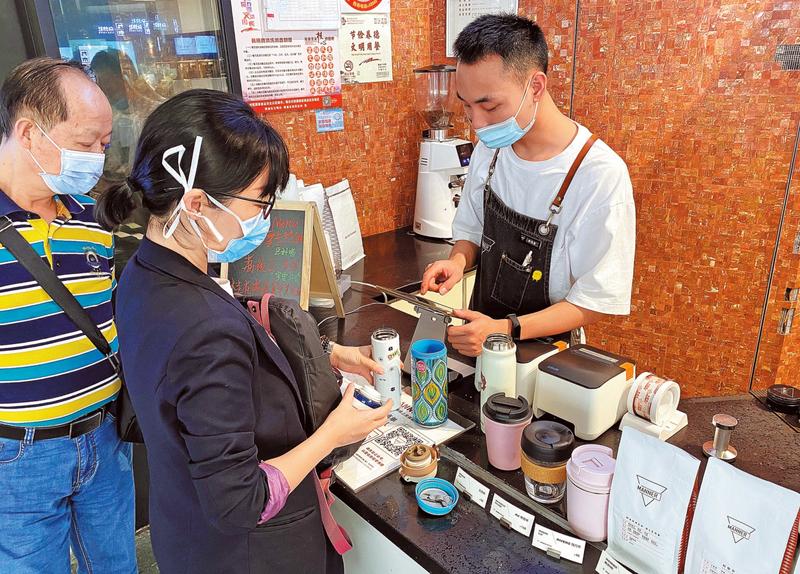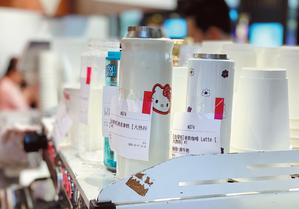The trend of bringing one's own cup to buy coffee is picking up pace in Shanghai as more consumers become aware of the importance of being environmentally friendly, He Qi reports.
 A consumer holding her own cup buys coffee at Manner Coffee in Shanghai. (HE QI / CHINA DAILY)
A consumer holding her own cup buys coffee at Manner Coffee in Shanghai. (HE QI / CHINA DAILY)
Fan Lihong, her parents and her daughter are standing along Madang Road in Shanghai, cups in hand. Many others in the line are doing the same.
From afar, such a scene might seem reminiscent of water rationing. But these individuals are simply after a caffeine fix, with sustainability in mind.
"I have been using my own cups to buy coffee this year. Using my own cup is not only convenient and cost effective-it also helps with environmental protection," says Fan.
I have been using my own cups to buy coffee this year. Using my own cup is not only convenient and cost effective — it also helps with environmental protection
Fan Lihong, Shanghai resident
Another customer who was waiting in a line outside Manner Coffee, Liu Shiyun, echoes the same sentiment.
"A latte at Manner Coffee costs 15 yuan (US$2.24). If I use my own cup to buy the coffee, I get 5 yuan discount and will save at least 100 yuan per month," Liu says.
"I hope more coffee shops can promote this concept as it is environmentally friendly and cost-effective."
Manner Coffee, which operates over 100 stores across China, sells nearly 100,000 cups of coffee per day. A quarter to a third of their customers bring their own cups, according to Ning Yihan, marketing representative of Manner.
"We started to encourage consumers to bring their own non-disposable cups to Manner stores since the day we were established. We hope to contribute to environmental protection with our customers," Ning says.
"It is very interesting and meaningful while you see all kinds of people bringing their own cups. There are Japanese-style izakaya store owners bringing beer mugs and security or sanitation workers with their thermoses," she adds.
For others like Ping Jing, a 26-year-old nurse who usually buys her coffee from Writer Coffee on Weihai Road, using her own mug is not just about cutting down on costs, but taste as well.
"A glass cup or mug will give you a different taste and an exclusive feel compared with using the disposable paper cup," she says.
"More people are drinking coffee today. We don't just wish to drink coffee-we also hope this habit can be environmentally friendly."
According to Zhang Ling, founder of Writer Coffee, nearly two-thirds of her customers bring their own cups.
"In the beginning, it was mostly foreign guests who brought their own cups because they're used to doing so. Later, more Chinese started to do the same as we have been promoting the discounts that they can enjoy if they do so," says Zhang.
 Cups belonging to consumers are seen in a cafe in Shanghai. (HE QI / CHINA DAILY)
Cups belonging to consumers are seen in a cafe in Shanghai. (HE QI / CHINA DAILY)
Writer Coffee currently offers a 5 yuan discount to guests who consume their coffee using a mug from the cafe. It also loans cups to customers who prefer not to use the disposable option.
To date, one-fifth of Writer Coffee's customers choose to leave their cups in the store.
Zhu Yifan, 32, who works in an office located near Writer Coffee, leaves her cup in the store every day after work and picks it up in the morning before work. What motivated her to carry out this practice are the garbage-sorting measures and empty-plate movement, or anti-food-waste movement, that the government has been promoting in recent times.
According to a China Central Television survey last year, Starbucks uses 4 billion disposable cups that require 1.6 million trees to make each year. The survey also lists some fast-food chain enterprises, which sell a large number of cups of beverages.
While the survey points out that most consumers would dispose of these cups into the recyclable section of rubbish bins, a garbage-collection station in Beijing says that wet and dirty paper cups will not be recycled.
"In order to improve its anti-osmosis and strength, we paste a layer of plastic on the cups so that it became a composite paper product, and this interferes with paper recycling. The cost of separating the plastic from the paper cup is very high," Tsinghua University environment professor Liu Jianguo tells China Central Television.
"We can only try to avoid the use of such cups in the first place. If we have to use it, then we use it as many times as possible to prolong its service life."
Other countries around the world have also set their eyes on reducing the use of disposable paper cups and encourage people to use more environmentally options.
For example, Ireland's environment minister announced in November 2019 that consumers who use disposable cups will by 2021 be subjected to a "latte tax".
It was also reported that the United Kingdom uses 2.5 billion disposable paper cups a year, almost none of which are recycled. For this reason, British legislators have called for a tax on paper cups as they believe that manufacturers of these products should pay more.
The UK's House of Commons Environmental Audit Committee had also urged the government to set a goal of recycling all disposable cups by 2023, failing which an outright ban on such products should be put in place.
Contact the writer at heqi@chinadaily.com.cn


